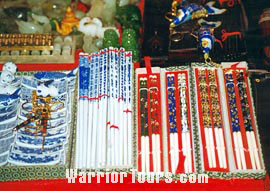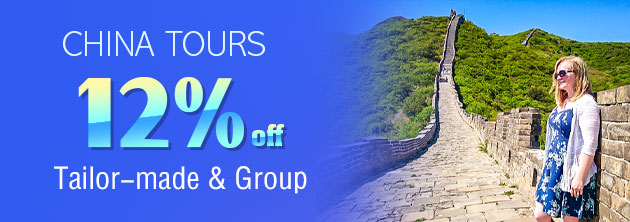Food Culture
![]() Chopsticks
Chopsticks
Chinese simply choose chopsticks as their tableware rather than knife and fork since Chinese people, under cultivation of Confucianism, consider knife and fork bearing sort of violence, like cold weapons. However, chopsticks reflect gentleness and benevolence, the main moral teaching of Confucianism.

Chinese food seems to taste better eaten with chopsticks which are the special utensil Chinese use to dine. It will be an awkward experience for foreigners to use chopsticks to have a meal. Fortunately, learning to eat with chopsticks is not difficult.
The truth of using chopsticks is holding one chopstick in place while pivoting the other one to pick up a morsel. How to position the chopsticks is the course you have to learn. First, place the first chopstick so that thicker part rests at the base of your thumb and the thinner part rests on the lower side of your middle fingertip. Then, bring your thumb forward so that the stick will be firmly trapped in place. At least two or three inches of chopstick of the thinner end should extend beyond your fingertip. Next, position the other chopstick so that it is held against the side of your index finger by the end of your thumb. Check whether the ends of the chopsticks are even. If not, then tap the thinner parts on the plate to make them be even. Ok, now you are going to practice. Just place a little pressure on the upper chopstick, the one against your index finger, to make it pivot on the index finger while keep the bottom chopstick stationary. Isn't it easy?
 After a little practice, you can use them to enjoy your Chinese food. Certainly in the first a few attempts, you have to take care.
After a little practice, you can use them to enjoy your Chinese food. Certainly in the first a few attempts, you have to take care.
Using chopsticks to eat rice is a problem to most foreigners. Generally the tip to eat rice is to bring one's rice bowl close to one's mouth and quickly scoop the rice into it with one's chopsticks. Since this is difficult for foreigners and so simply lifting portions of rice to the mouth from the bowl held in the other hand is perfectly acceptable.
There are superstitions associated with chopsticks too. If you find an uneven pair at your table setting, it means you are going to miss a boat, plane or train. Dropping chopsticks will inevitably bring bad luck. Crossed chopsticks are, however, permissible in a dim sum restaurant. The waiter will cross them to show that your bill has been settled, or you can do the same to show the waiter that you have finished and are ready to pay the bill.

![]() Table manners
Table manners
In China, since people eat together, usually the host will serve you some dishes with his or her own chopsticks to show his or her hospitality. Since this is different with the Western customs, you can leave the food alone if you feel too awkward. There some other rules you are suggested to follow to make your stay in China happier, though you will be forgiven if you have no idea what they are.
![]() Never stick your chopsticks upright in the rice bowl, since that usually appears on the funeral and is deemed extremely impolite to the host and seniors present.
Never stick your chopsticks upright in the rice bowl, since that usually appears on the funeral and is deemed extremely impolite to the host and seniors present.
![]() Make sure the spout of the teapot is not facing anyone. The proper way is make it direct outward from the table.
Make sure the spout of the teapot is not facing anyone. The proper way is make it direct outward from the table.
![]() Don't tap on your bowl with your chopsticks, since that will be deemed insult to the host or the chef.
Don't tap on your bowl with your chopsticks, since that will be deemed insult to the host or the chef.
![]() Never try to turn a fish over and debone it yourself, since the separation of the fish skeleton from the lower half of the flesh will usually be performed by the host or a waiter. Superstitious people will deem bad luck will ensue and a fishing boat will capsize otherwise.
Never try to turn a fish over and debone it yourself, since the separation of the fish skeleton from the lower half of the flesh will usually be performed by the host or a waiter. Superstitious people will deem bad luck will ensue and a fishing boat will capsize otherwise.
![]() Food Symbolism
Food Symbolism
In China, foods are given different meanings, so that in certain occasion a kind of food, can only be eaten by some specific individuals, or a kind of food must be eaten in specific occasion.

Usually, an honored guest will be served a snapper's head or shell to hail him and show warmly welcome in some districts.
Long noodle is the symbol of longevity in China, so that youngsters or seniors all will have a bowl of Long Life Noodle to expect a healthy life.
In Central China, if a baby is born, his father will send Red Boiled Egg to announce the news. An even number, usually six or eight, of Red Boiled Egg with a black point dotted on one end will be delivered for a boy, and an odd number, usually five or seven without black point for a girl.
Fish is always served to symbolize prosperity and wealth accumulation in the New Year's Eve.
There are other foods and snacks symbolizing good wishes under special circumstances, such as duck, chicken and melon seeds.

